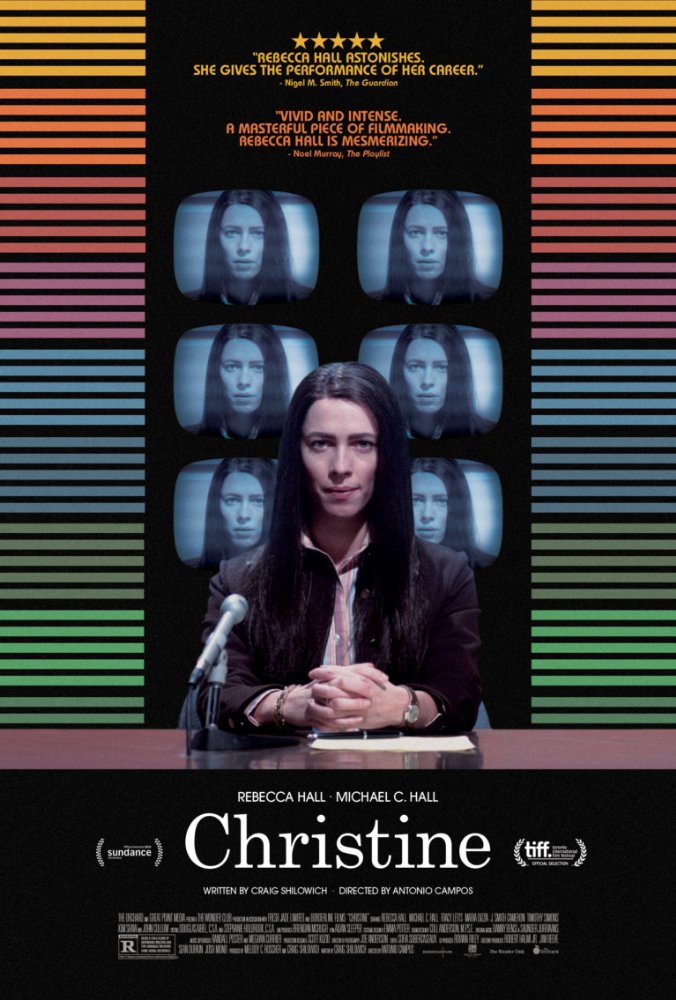Joyce Glasser reviews Christine (January 27, 2017)
Christine, a biopic of the suicidal 29-year-old broadcast news reporter Christine Chubbuck (Rebecca Hall), keeps the audience in a state of slow-burning suspense from start to finish. Script writer Craig Shilowich and director Antonio Campos (Simon Killer) maintain this tension by tracing, in a kind of count-down to tragedy, her life in the run-up to the suicide, stopping at the various incidents, revelations, encounters, breakthroughs, set-backs and relationships that singularly or collectively, affect this bi-polar broadcaster with high expectations.
 It is 1974, and WXLT-TV is a small, independent television channel run Michael Nelson (Tracy Letts) with only 10,000 viewers in the Sarasota, Florida Area. Its struggle for ratings is behind a policy of ‘if it bleeds, it leads’, a sensationalist policy that community- minded reporter Christine Chubbuck, who is new to the staff, abhors. An attractive, though distant woman with a degree in broadcasting from Boston University, Christine is an intelligent and ambitious but has a checkered past. This past is referred to obliquely by Christine’s mother, Peg (a heart-breaking performance from J Smith-Cameron) who comes to live with Christine in the family’s former summer cottage after her divorce. (The filmmakers mention her brother Greg, who also made the move from Ohio, but he does not appear in the film).
It is 1974, and WXLT-TV is a small, independent television channel run Michael Nelson (Tracy Letts) with only 10,000 viewers in the Sarasota, Florida Area. Its struggle for ratings is behind a policy of ‘if it bleeds, it leads’, a sensationalist policy that community- minded reporter Christine Chubbuck, who is new to the staff, abhors. An attractive, though distant woman with a degree in broadcasting from Boston University, Christine is an intelligent and ambitious but has a checkered past. This past is referred to obliquely by Christine’s mother, Peg (a heart-breaking performance from J Smith-Cameron) who comes to live with Christine in the family’s former summer cottage after her divorce. (The filmmakers mention her brother Greg, who also made the move from Ohio, but he does not appear in the film).
At first the change of scene seems to be benefitting Christine. She is a popular volunteer at Sarasota Memorial Hospital (where she was to die within the year) putting on puppet shows for children with learning difficulties, and takes her new job, as the reporter/anchor of a community affairs talk show, Suncoast Digest, very seriously. Siesta Key is a growing, and increasingly wealthy, community and Christine is addressing social and environmental issues like a crusader on a mission. At the time of her death, she had been nominated for Forestry and Conservation Recognition Award, but these worthy reports did not appeal to advertisers.
Moreover, with her Joan Baez looks, serious personality, and stern, probing dark eyes, she does not fit the Barbie-doll image of the female anchor the networks were after. Within a short time, we get the impression that a pattern is emerging in Christine’s life where things turn sour. To add to her growing professional discontent, Christina learns that she has to have an ovary removed: a procedure that will limit her chances of becoming pregnant to a year from the removal.
In a scene in which we are made as uncomfortable as the couple she approaches, Christine, who has been stood up in a restaurant, walks over to a young man and woman. ‘You look like you are very much in love,’ she tells them, to which they reply, ‘We are,’ and hope that is the end of it. When Christine tells them she is a reporter on the lookout for human interest stories, they become increasingly annoyed. Forced to leave, she calls out, ‘Don’t lose sight of what you have.’
Desperate, to find a lover and conceive while there is still time, (Christine admits to a colleague that she is still a virgin), she turns to affable star anchor George Ryan (Michael C Hall) on whom she has had a crush since joining the network a year earlier. In an increasingly ominous segment, the two go out to dinner together, Christine, happier than she has been in months, and looking very attractive. But Christine has misread Peter’s intentions in inviting her out. After dinner, admitting that he had been an alcoholic, and, like Christine, had issues to work out, he takes her to a meeting of his former self-group. Further disappointment comes when she learns that George has landed a promotion in Baltimore, one that she was hoping for. Then comes the ultimate humiliation. Through an apparently invented character, station owner Bob Anderson (John Cullum), she learns that that George has invited his girlfriend Andrea Kirby (Kim Shaw), the sports anchor, to accompany him.
Although the self-deprecating Christine rejects compliments, she takes criticism intensely personally. Nelson shoots down Christine’s ideas until she finally breaks. When Nelson tells her that one of her stories will be replaced by a piece on serial killers by Jean Reed (Maria Dizzia), Christine’s camera operator and her only friend in Sarasota, she screams personal insults at Nelson in front of the whole newsroom.
True to form, Christine’s last words are a protest on the insidious trend that was curtailing her career. Staring at the camera, she announces, “In keeping with Channel 40’s policy of bringing you the latest in blood and guts, and in living colour – you are going to see another TV first: attempted suicide.” Ironically, only 1,000 people were watching, and the tape has been locked in a vault since 1974.
The cast, in particularly Michael Hall and Tracy Letts, is uniformly strong, but this is British/American actress Rebecca Hall’s (Please Give, Vicky, Cristina Barcelona, Everything Must Go) film and the performance of her career. Her emotionally-charged scenes are each distinctive, filled with nuance and such depth of feeling that much more is conveyed than is in written in the script. Christine’s strength and aggression is continually doing battle with her vulnerability and inability to compromise as an adult. That Hall has been left off BAFTA’s Best Actress nominees must be a reflection of that charity’s general disregard for low budget films with small publicity budgets that have not been embraced by Hollywood.
You can watch the film trailer here:




